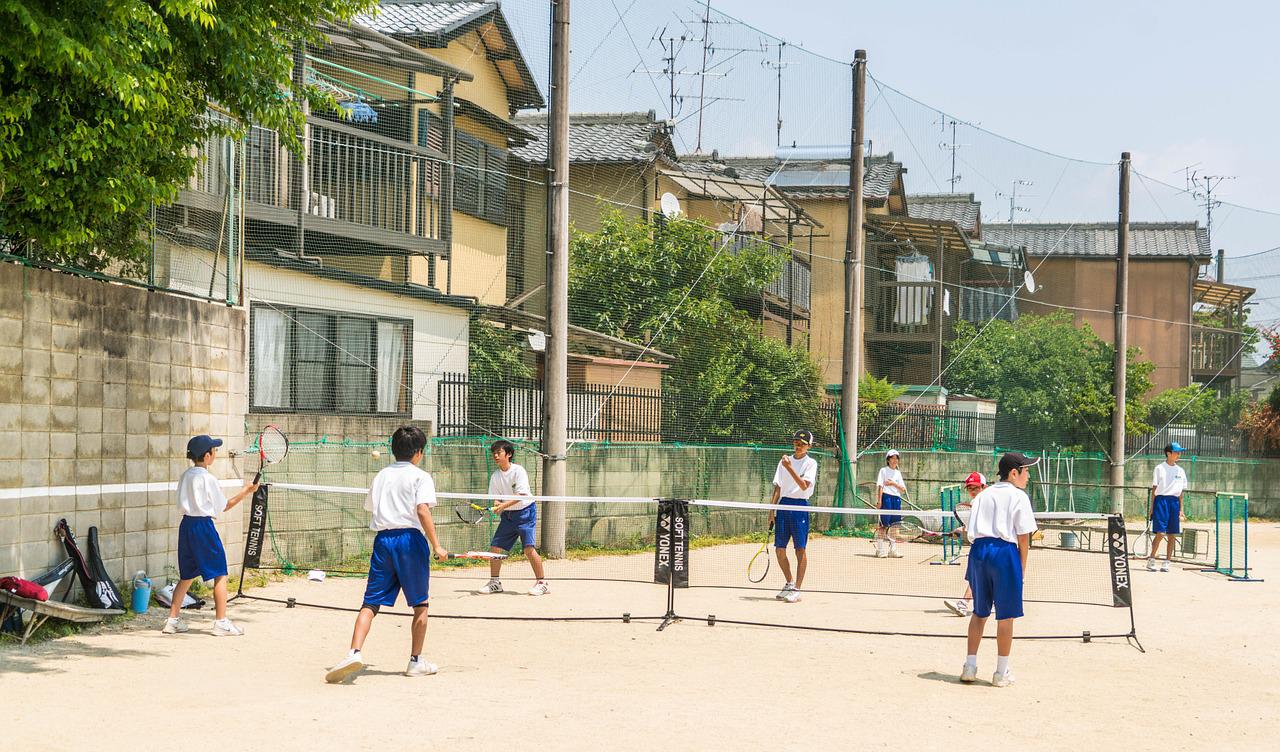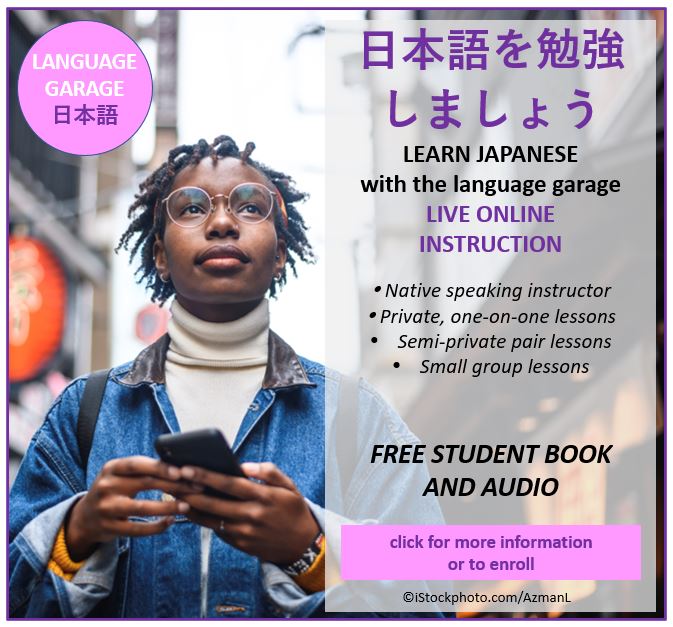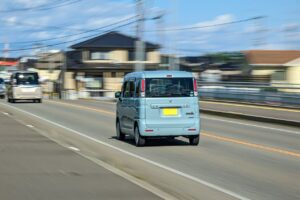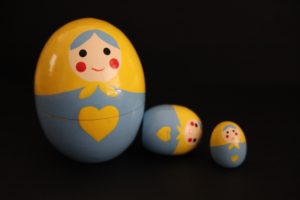Image Credit: Michelle_Raponi on Pixabay
In this post we’ll look at lots of action verbs that will come in handy when you’re talking everyday life.
どこに行きますか。 Doko ni ikimasu ka. Where are you going?
Let’s start with a bunch of verbs to talking about coming and going: 行く iku to go; 歩く aruku to walk; 来る kuru to come, 出る deru to leave; 着く、到着する tsuku, tōchakusuru to arrive; 出掛ける dekakeru to go out; 入る hairu to enter.
- 車で仕事に行きます。 歩いて仕事に行きます。
Kuruma de shigoto ni ikimasu. Aruite shigoto ni ikimasu.
I go to work by car. I go to work on foot. - 毎週日曜日に公園で歩きます。
Maishū nichiyōbi ni kōen de arukimasu.
We walk in the park every Sunday.
- 今週末のパーティーには誰が来ますか。
Konshūmatsu no pātī ni wa dare ga kimasu ka.
Who’s coming to the party this weekend? - たいてい退社時間が遅いです。
Taitē taisha jikan ga osoi desu.
I usually leave work late. - 電車は午前10時に到着します。
Densha wa gozen jūji ni tōchakushimasu.
The train arrives at 10am. - 友達と出掛けます。
Tomodachi to dekakemasu.
I go out with my friends. - 夜、公園には絶対に行きません。
Yoru, kōen ni wa zettai ni ikimasen.
I never go in the park at night.
何時に起きますか。 Nanji ni okimasu ka. What time do you wake up?
Now let’s see some verbs that you can use to talk about your daily routine: 起きる okiru to wake up; シャワーを浴びる shawā o abiru to take a shower; お風呂に入る ofuro ni hairu to take a bath; 服を着る fuku o kiru to get dressed; シャツを着る shatsu o kiru to put on a shirt; 服を脱ぐ fuku o nugu to get undressed; パンツを脱ぐ pantsu o nugu to take off pants; 歯を磨く ha o migaku to brush your teeth; 手を洗う te o arau to wash your hands; {朝ご飯・昼ご飯・晩ご飯}を食べる {Asagohan/ Hirugohan/ Bangohan} o taberu to have breakfast/lunch/dinner; 寝る neru to go to bed, to sleep.
- 平日は早く起きて、週末は遅くまで寝ています。
Hējitsu wa hayaku okite, shūmatsu wa osoku made nete imasu.
I wake up early during the week, and l wake up late on the weekend. - いつも朝シャワーを浴びます。お風呂には入りません。
Itsumo asa shawā o abimasu. Ofuro ni wa hairimasen.
I always take a shower in the morning. I never take a bath. - 素早く服を着ます。
Subayaku fuku o kimasu.
I get dressed quickly. - 寒い時はセーターを着ます。
Samui toki wa sētā o kimasu.
She puts on a sweater when it’s cold. - 寝る前に服を脱ぎます。
Neru mae ni fuku o nugimasu.
I get undressed before bed. - 家の中では靴を脱ぎます。
Ie no naka de wa kutsu o nugimasu.
He takes off his shoes in the house. - 食べたら歯を磨きます。
Tabetara ha o migakimasu.
I brush my teeth after I eat. - 食べる前に手を洗います。
Taberu mae ni te o araimasu.
I wash my hands before I eat. - たいてい何時に寝ますか。
Taitē nanji ni nemasu ka.
What time do you usually go to bed? - たいてい何時間寝ますか。
Taitē nanjikan nemasu ka.
How many hours do you usually sleep?
よく喋ります。 Yoku shaberimasu. He talks a lot.
Here are several general verbs that you can use in daily life. 話す、喋る hanasu, shaberu to speak, to talk; 言う iu to say; 分かる wakaru to understand; 学ぶ manabu to learn; 勉強する benkyōsuru to study; あげる ageru to give; 作る tsukuru to make; 乗る noru to take (transportation); 持っていく motte iku to take, to bring something somewhere; 連れていく tsurete iku to take a person somewhere; きく kiku to ask; 答える kotaeru to answer; 開ける akeru to open; 閉める shimeru to close; 使う tsukau to use; 拾う hirou to pick up (something from the floor); 取りに行く tori ni iku to pick up (to go somewhere to get something); 迎えに行く mukae ni iku to pick up (to go to collect someone); 置く oku to put.
- 何か国語が話せますか。
Nankakokugo ga hanasemasu ka.
How many languages do you speak? - 毎日友達と話します。
Mainichi tomodachi to hanashimasu.
I talk with my friends every day. - 何と言っていますか。分かりません。
Nan to itte imasu ka. Wakarimasen.
What is she saying? I don’t understand. - 子供は学校でたくさんのことを学びます。
Kodomo wa gakkō de takusan no koto o manabimasu.
Children learn a lot in school. - 大学で何を勉強していますか。
Daigaku de nani o benkyōshite imasu ka.
What do you study at university? - 友達の誕生日にプレゼントをあげました。
Tomodachi no tanjōbi ni purezento o agemashita.
I give my friend a present on her birthday. - 子供達は両親のためにプレゼントを作りました。
Kodomotachi wa ryōshin no tame ni purezento o tsukurimashita.
The children make gifts for their parents. - 朝は電車とバスのどちらを使いますか。
Asa wa densha to basu no dochira o tsukaimasu ka.
Do you take the train or the bus in the morning? - 子供達はたくさん質問します。
Kodomotachi wa takusan shitsumonshimasu.
Children ask a lot of questions. - 先生は質問に答えます。
Sensē wa shitsumon ni kotaemasu.
The teacher answers questions. - ドアを開けます。
Doa o akemasu.
She opens the door. - ドアを閉めます。
Doa o shimemasu.
He closes the door. - ペンと鉛筆のどちらを使いますか。
Pen to enpitsu no dochira o tsukaimasu ka.
Do you use a pen or a pencil? - バッグを取りに行きます。
Baggu o tori ni ikimasu.
I pick up my bags. - たいてい引き出しの中に鍵を入れています。
Taitē hikidashi no naka ni kagi o irete imasu.
I usually put my keys in a drawer.
何を食べていますか。 Nani o tabete imasu ka. What are you eating?
Now let’s look at some verbs that you can use to talk about typical situations at home: 食べる taberu to eat; 飲む nomu to drink; 料理をする ryōri o suru to cook; 掃除をする sōji o suru to clean; 食器を洗う shokki o arau to do the dishes; 洗濯をする sentaku o suru to do the laundry; 食器をしまう shokki o shimasu to put away the dishes; テレビを見る terebi o miru to watch TV; 音楽を聴く ongaku o kiku to listen to music; 読む yomu to read; リラックスする rirakkusu suru to relax; 横になる yoko ni naru to lie down; 座る suwaru to sit down; 立ちあがる tachiagaru to stand up.
- ご飯をたくさん食べます。
Gohan o takusan tabemasu.
I eat a lot of rice. - 朝、コーヒーと紅茶のどちらを飲みますか。
Asa, kōhī to kōcha no dochira o nomimasu ka.
Do you drink tea or coffee in the morning? - 料理がとても上手ですね!
Ryōri ga totemo jōzu desu ne!
You cook very well! - 毎週土曜日に部屋を掃除します。
Maishū doyōbi ni heya o sōjishimasu.
I clean my apartment on Saturdays. - 毎晩食器を洗います。
Maiban shokki o araimasu.
We do dishes every evening. - 毎週日曜日に洗濯をします。
Maishū nichiyōbi ni sentaku o shimasu.
He does laundry on Sundays. - 食器がきれいになったらしまいます。
Shokki ga kirē ni nattara shimaimasu.
We put the dishes away when they are clean. - 毎晩テレビを見ますか。
Maiban terebi o mimasu ka.
Do you watch TV every evening? - 毎日音楽を聴きます。
Mainichi ongaku o kikimasu.
I listen to music every day. - 毎晩ベッドの中で本を読みます。
Maiban beddo no naka de hon o yomimasu.
I read every night in bed. - 週末はリラックスします。
Shūmatsu wa rirakkusu shimasu.
We relax every weekend. - 午後は横になります。
Gogo wa yoko ni narimasu.
I lie down in the afternoon. - リビングで座ります。
Ribingu de suwarimasu.
We sit down in the living room. - 立ち上がって部屋を出ます。
Tachiagatte heya o demasu.
He stands up and leaves the room.
食べ物を買います。 Tabemono o kaimasu. I’m buying food.
Here are some common verbs related to shopping: 買う kau to buy; 買い物に行く kaimono ni iku to go shopping; 探す sagasu to look for; 見つける mitsukeru to find; 支払う shiharau to pay; かかる kakaru to cost; 試着する shichakusuru to try on; お金を使う okane o tsukau to spend money; ATMでお金をおろす ATM de okane o orosu to withdraw money from an ATM; お金を節約する okane o setsuyakusuru to save money.
- スーパーで食料を買います。
Sūpā de shokuryō o kaimasu.
We buy food at the supermarket. - 週末に買い物をします。
Shūmatsu ni kaimono o shimasu.
We go shopping every weekend. - 新しい靴を探しています。
Atarashī kutsu o sagashite imasu.
I’m looking for a new pair of shoes. - この店でいつも面白いものを見つけます。
Kono mise de itsumo omoshiroi mono o mitsukemasu.
He always finds something interesting in this store. - 現金とクレジットカードのどちらで支払いますか。
Gen’kin to kurejitto kādo no dochira de shiharaimasu ka.
Do you pay by cash or credit card? - それはいくらですか。
Sore wa ikura desu ka.
How much does that cost? - 服を買う前にいつも試着します。
Fuku o kau mae ni itsumo shichakushimasu.
I always try on clothes before I buy them. - 本にお金をたくさん使います。
Hon ni okane o takusan tsukaimasu.
She spends a lot of money on books. - ATMでお金をおろします。
ATM de okane o oroshimasu.
I’m taking money out at the ATM. - 何でもとても高いのでお金が全然たまりません。
Nandemo totemo takai node okane ga zenzen tamarimasen.
I never save money because everything is so expensive.
お勤め先はどこですか。 Otsutome saki wa doko desu ka. Where do you work?
Now let’s look at some common verbs you can use at work: 働く hataraku to work; 始まる hajimaru to start; 終わる owaru to end; 書く kaku to write; 電話する denwasuru to call (on phone); メールをする mēru o suru to send an email; メールが来る mēru ga kuru to get an email; 休憩する kyūkēsuru to take a break; ミーティングがある mītingu ga aru to have a meeting; 話し合う hanashiau to discuss.
- 月曜日と、火曜日と、水曜日と、木曜日と、金曜日に働きます。土曜日と日曜日は働きません。
Getsuyōbi to, kayōbi to, suiyōbi to, mokuyōbi to, kin’yōbi ni hatarakimasu. Doyōbi to nichiyōbi wa hatarakimasen.
I work on Mondays, Tuesdays, Wednesdays, Thursdays, and Fridays. I don’t work on Saturdays and Sundays. - 毎週月曜日の午前10時にミーティングが始まります。
Maishū getsuyōbi no gozen jūji ni mītingu ga hajimarimasu.
The meeting starts every Monday at 10am. - ミーティングは何時に終わりますか。
Mītingu wa nanji ni owarimasu ka.
What time does the meeting end? - たくさんのレポートを書きます。
Takusan no repōto o kakimasu.
He writes a lot of reports. - クライエントに電話をします。
Kuraiento ni denwa o shimasu.
I call my clients on the phone. - たくさんメールをします。
Takusan mēru o shimasu.
She sends a lot of emails. - たくさんメールが来ます。
Takusan mēru ga kimasu.
She receives a lot of emails. - 午後に休憩をとってコーヒーを飲みます。
Gogo ni kyūkē o totte kōhī o nomimasu.
I take a break in the afternoon and drink some coffee. - ミーティングがたくさんあります。
Mītingu ga takusan arimasu.
We have a lot of meetings. - ミーティングで何を話し合いますか。
Mītingu de nani o hanashiaimasu ka.
What do they discuss in the meetings?
楽しい時間を過ごしています! Tanoshī jikan o sugoshite imasu! We’re having a good time!
Now that we’ve gotten work out the way, let’s see some verbs that you can use for your free time: 楽しい時間を過ごす tanoshī jikan o sugosu to have a good time/to enjoy yourself; 踊る odoru to dance; 歌う utau to sing; 笑う warau to smile, to laugh, 運動する undōsuru to work out; 泳ぐ oyogu to swim; 走る hashiru to run; する suru to play (a sport); 弾く hiku to play (keyboard, a string instrument); 吹く fuku to play (a wind instrument); 叩く tataku to play (drums, a percussion instrument); 飛び跳ねる tobihaneru to jump; 登る noboru to climb; 這う hau to crawl; 自転車に乗る jitensha ni noru to bike; 運転する untensuru to drive; 投げる nageru to throw; 受ける ukeru to catch.
- 友達といつも楽しい時間を過ごしています。
Tomodachi to itsumo tanoshī jikan o sugoshite imasu.
I always have a good time with my friends. - 毎週末ナイトクラブに行って踊ります。
Maishūmatsu naitokurabu ni itte odorimasu.
We go to nightclubs and dance every weekend. - 歌がとても上手です!
Uta ga totemo jōzu desu!
She sings really well! - いつも笑っています。悲しくなることはありません。
Itsumo waratte imasu. Kanashikunaru koto wa arimasen.
He always smiles. He’s never sad. - 彼らは一緒にいる時、笑っています。
Karera wa isshoni iru toki, waratte imasu.
They laugh when they’re together. - 週に4、5回運動します。
Shū ni shi go kai undōshimasu.
I work out four or five days a week. - プールと湖とどちらで泳ぎますか。
Pūru to mizūmi to dochira de oyogimasu ka.
Do you swim in a pool or in a lake? - 子供たちは公園で走ります。
Kodomotachi wa kōen de hashirimasu.
The children run in the playground. - {野球・バスケットボール・サッカー}をします。
{Yakyū/Basukettobōru/Sakkā} o shimasu.
We play baseball/basketball/soccer. - {ピアノ・バイオリン}を弾きます。
{Piano/Baiorin} o hikimasu.
I play piano/violin. - トランペットを吹きます。
Toranpetto o fukimasu.
I play trumpet. - 男の子達はベッドの上で飛び跳ねます。
Otokonoko tachi wa beddo no ue de tobihanemasu.
The boys jump on the bed. - 女の子達は木に登ります。
On’nanoko tachi wa ki ni noborimasu.
The girls climb trees. - 赤ちゃんは床をハイハイします。
Akachan wa yuka o haihaishimasu.
The baby crawls on the floor. - 毎週末、公園でサイクリングをします。
Maishūmatsu, kōen de saikuringu o shimasu.
We bike every weekend in the park. - 毎日車で通勤します。
Mainichi kuruma de tsūkinshimasu.
I drive to work every day. - 男の子はボールを投げます。
Otokonoko wa bōru o nagemasu.
The boy throws the ball. - 女の子はボールを受けます。
On’nanoko wa bōru o ukemasu.
The girl catches the ball.
何かにおいがします。 Nani ka nioi ga shimasu. I smell something.
Here are a few verbs related to the senses: においがする nioi ga suru to smell; 聞こえる kikoeru to hear; 見える mieru to see; 味見をする ajimi o suru to taste; 触る sawaru to touch; 感じる kanjiru to feel; 見える mieru to seem/appear; 考える、思う kangaeru, omou to think; 信じる shinjiru to believe; 知っている shitte iru to know; 人を知っている hito o shitte iru to know a person.
- 焼きたてのパンの匂いがします。
Yakitate no pan no nioi ga shimasu.
We smell fresh bread. - この花はとてもいい匂いがします!
Kono hana wa totemo ī nioi ga shimasu!
This flower smells really nice! - 子供は見るもの全てを触ります。
Kodomo wa miru mono subete o sawarimasu.
The child touches everything he sees. - 鳥の声が聞こえますか。
Tori no koe ga kikoemasu ka.
Do you hear the birds? - あそこの女の人が見えますか。
Asoko no on’na no hito ga miemasu ka.
Do you see the woman over there? - 料理をする時、いつも味見をします。
Ryōri o suru toki, itsumo ajimi o shimasu.
I always taste food while I cook. - このスープはおいしいです。
Kono sūpu wa oishī desu.
This soup tastes good. - 今日の気分はどうですか。
Kyō no kibun wa dō desu ka.
How do you feel today? - 何か気がかりなことがあるようです。
Nani ka kigakarina koto ga aru yō desu.
She seems unhappy about something. - 何を考えていますか。
Nani o kangaete imasu ka.
What are you thinking about? - 説明を信じますか。
Setsumē o shinjimasu ka.
Do you believe his explanation? - あれは何ですか。分かりません。
Are wa nan desu ka. Wakarimasen.
What is that? I don’t know. - 妹さんを知っています。
Imōtosan o shitte imasu.
I know his sister.
聞こえません! Kikoemasen! I can’t hear you!
Now let’s look at a few modals and types of verbs that you can combine with other verbs: できる dekiru can do; やり方を知っている yarikata o shitte iru know how to do; ~なければならない …nakereba naranai must do/have to do; ~たい …tai want to do; ~なければならない …nakereba naranai need to do; ~始める …hajimeru start doing; ~のをやめる …no o yameru stop doing; ~続ける …tsuzukeru continue/keep doing.
- テレビが見えますか。
Terebi ga miemasu ka.
Can you see the television? - ギターの弾き方を知っていますか。
Gitā no hikikata o shitte imasu ka.
Do you know how to play guitar? - 明日仕事をしなければなりません。
Ashita shigoto o shinakereba narimasen.
I have to work tomorrow. - 今夜は何がしたいですか。
Kon’ya wa nani ga shitai desu ka.
What do you want to do tonight? - 勉強しなければなりません。明日テストがあります。
Benkyō shinakereba narimasen. Ashita tesuto ga arimasu.
I need to study. I have a test tomorrow. - 朝早くから仕事を始めます。
Asa hayaku kara shigoto o hajimemasu.
We start working early in the morning. - 夜12時に読書をやめて寝ます。
Yoru jūniji ni dokusho o yamete nemasu.
I stop reading at midnight and go to bed. - 映画の上映中、話し続けていました。
Ēga no jōēchū, hanashi tsuzukete imashita.
They keep talking during the movie.
Learn Japanese with the Language Garage
Check out our other posts on Japanese language, culture, and more. And if you’re looking for convenient and affordable live Japanese lessons with a real teacher, check out the Language Garage. Our lessons are given online in a virtual classroom, so it doesn’t matter where you live or work – we can come to you. And we have flexible options, with a free trial so that you can decide if there’s a fit. Check us out!






